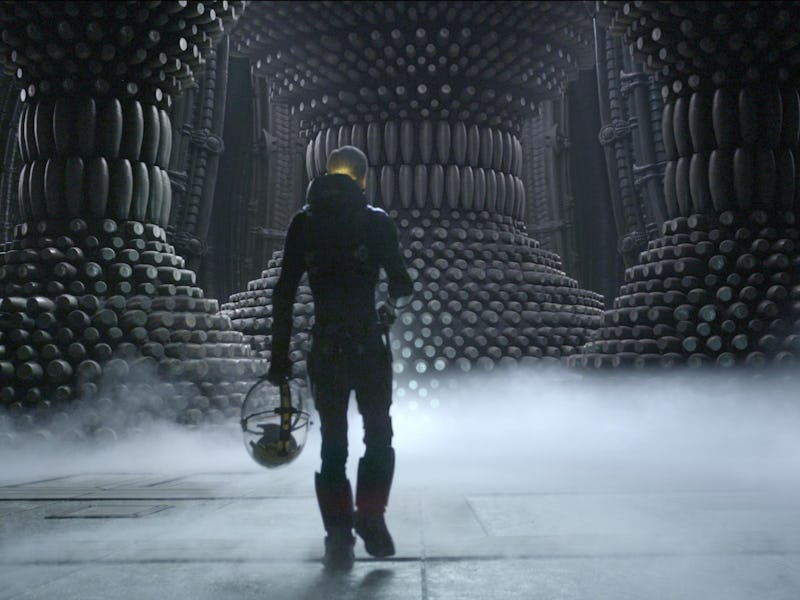Romulus Proves Why The Most Underrated Alien Movie Is Secretly Great
Sorry, but this is how you do a soft franchise reboot.

Improbably, the latest Alien spinoff film — Alien: Romulus — is not only slaying at the box office but raking in decent reviews, too. With a respectable 82 percent critical score and 86 percent audience score on Rotten Tomatoes, the consensus of Romulus is that it’s very much your parent’s Alien movie, but that’s okay. And while we can all agree that this is almost certainly an Alien movie that wants to remind you that it's an Alien movie with lots of callbacks and references to the more beloved entries in the franchise, the more discerning among Romulus watchers may have noticed that many of us are all starting to talk about Prometheus again.
Twelve years ago, Ridley Scott dropped the Alien prequel that nobody asked for with an absolutely killer cast, game-changing details about the Alien world and a big-swing premise unlike any of the other movies in the franchise. With Romulus incorporating some tricky Prometheus lore into its basic premise, now is the time to revisit the riskiest, most beautifully strange, and ultimately, underrated masterpiece of this sticky, unwieldy franchise.
The anti-Alien movie
Noomi Rapace as Shaw in Prometheus; a different kind of hero than Ripley.
In nearly every way, Prometheus pushes against its own status as a movie that is required to be a prequel to Alien. Taking place at the end of the 21st century, in the year 2093, it tells the story of an expedition to an exomoon very near the place where the Nostromo will eventually find the crashed ship containing the famous “Space Jockey.” Notably, Prometheus is more concerned with the identity of that massive alien, rather than the titular chest-bursting Xenomorphs. Our defacto hero, Dr. Elizabeth Shaw (Noomi Rapace), is a wide-eyed archaeologist who also believes there just might be a God.
In Prometheus, meeting your maker literally happens, as the crew of the titular spaceship locates at least one member of a species called The Engineers, literal giants who placed some inky goo into the primordial soup of Earth which eventually led to the creation of humanity. This panspermia-by-design premise was not brand-new in science fiction. Star Trek famously tried it out in 1993, which later redefined all the rules of that particular universe. Discovery’s most recent 2024 season was also 100 percent focused on these Progenitors; Star Trek’s versions of the Engineers from Prometheus.
But where Star Trek made ancient aliens kindly, Ridley Scott presented Engineers as amoral, vengeful gods. No major spoilers here, but when one Engineer meets an android named David (Michael Fassbender), the encounter does not go well. While Prometheus has plenty of gross-out parasitical creature moments, the most horrifying thing about the movie is the fact that the crew went searching for God and the meaning of life, and basically found Hell instead.
A larger Alien world
With Prometheus, Ridley Scott truly expanded his own universe.
Featuring Charlize Theron and Idris Elba in what are essentially supporting roles as Vickers and Janek, even the smaller parts of Prometheus are designed to be dynamic and believable. The artificial David, played brilliantly by Fassbender, is perhaps the most unique evil robot in all of science fiction. Scott has often cited 2001: A Space Odyssey as one of his favorite films, but with Prometheus, he elevated the concept of a morally ambiguous AI into new cinematic territory. David is not a mindless drone, programmed with Terminator-like efficiency, nor is he like Data in Star Trek, a kindly Tin Man who does have a heart, even if he doesn’t know it.
David instead pushes back against familiar tropes about robots and becomes the ultimate metaphor for the movie’s search for authenticity. Unlike Shaw and the other god-fearing humans on board the Prometheus, David knows his creators, and he despises them. So upon the crew’s first discovery of an Engineer’s corpse, which Dr. Shaw reanimates aboard the ship only for it to writhe in pain and explode, David muses aloud, “Mortal after all.” The humans that created David are just imperfect reproductions of great beings that are just as killable. And ironically David is the one who will live forever.
Micahel Fassbender as David changed the robot game forever.
Yes, Prometheus has a horrifying squid create that gets inside Shaw. Yes, we’re wondering if Vickers is also a robot like David. And yes, there is some confusion about whether or not the lineage of the Xenomorphs even makes sense after this film. But, what Ridley Scott did so brilliantly with this movie is to make the horror of the parasitical aliens simply one aspect of a larger, richer universe. The creatures that Shaw and the crew have to contend with are not the reason you’re watching the movie, which is probably why this film, smartly, doesn’t even have Alien in the title.
Romulus may be a compact franchise product that allows new viewers to enjoy the Alien saga anew. But, it doesn’t even come close to the depth and introspection of Prometheus. If Romulus is a compilation of Alien's greatest hits, then Prometheus is like Ridley Scott’s experimental solo album. In another 12 years, we may not be talking about Romulus anymore. But we’ll still be thinking about Prometheus.